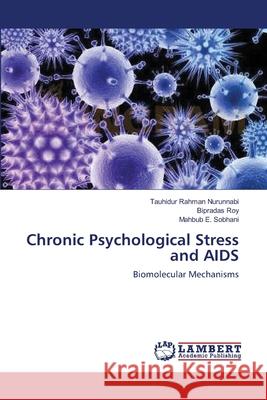Chronic Psychological Stress and AIDS » książka
Chronic Psychological Stress and AIDS
ISBN-13: 9783659227226 / Angielski / Miękka / 2012 / 96 str.
Chronic Psychological stress has several adverse effects both on HIV- people and on HIV+ patient. When the HIV- people are concerned, stress makes them more susceptible to HIV infection. T-cells have CXCR4 receptor and Macrophage have CCR5 receptor which can bind with both glucocorticoid and catecholamine hormone. HIV has GP120 protein which has to bind with both CD4 and CXCR4/CCR5 receptor for its entry into the host cells. Mental stress increases glucocorticoid and catecholamine concentration in blood. When these stress hormones, glucocorticoid and catecholamine, bind with the CXCR4/CCR5 receptors, cAMP signaling pathway gets activated. This signal transduction pathway leads to the synthesis of more CXCR4 and CCR5 receptors by those cells, which in turn become more susceptible to HIV infection. Stress inhibits Th2 when the cell produces INF- as a response to viral attacks. So that other cells remain vulnerable to viral infection. When T-cell count is decreased in the blood, the body cannot protect itself from other opportunistic infectious pathogens. As a result progression of AIDS is increased."
Chronic Psychological stress has several adverse effects both on HIV- people and on HIV+ patient. When the HIV- people are concerned, stress makes them more susceptible to HIV infection. T-cells have CXCR4 receptor and Macrophage have CCR5 receptor which can bind with both glucocorticoid and catecholamine hormone. HIV has GP120 protein which has to bind with both CD4 and CXCR4/CCR5 receptor for its entry into the host cells. Mental stress increases glucocorticoid and catecholamine concentration in blood. When these stress hormones, glucocorticoid and catecholamine, bind with the CXCR4/CCR5 receptors, cAMP signaling pathway gets activated. This signal transduction pathway leads to the synthesis of more CXCR4 and CCR5 receptors by those cells, which in turn become more susceptible to HIV infection. Stress inhibits Th2 when the cell produces INF-γ as a response to viral attacks. So that other cells remain vulnerable to viral infection. When T-cell count is decreased in the blood, the body cannot protect itself from other opportunistic infectious pathogens. As a result progression of AIDS is increased.











